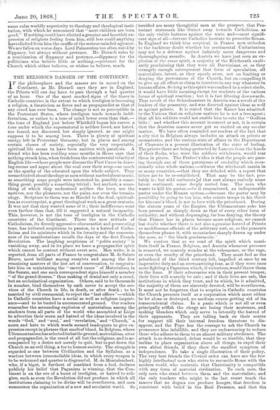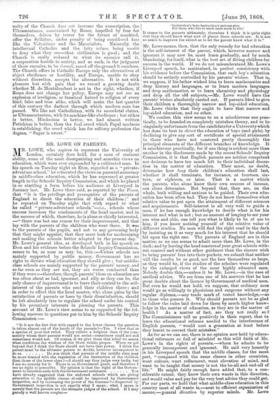THE RELIGIOUS DANGER OF THE CONTINENT.
IF the philosophers and the masses are in accord on the Continent, as Mr. Disraeli says they are in England, the Priests will one day have to pass through a bad quarter of an hour. One of the most marked signs of the times in Catholic countries is the extent to which irreligion is becoming a religion, a fanaticism as fierce and as propagandist as that of any creed has ever been. The change is not so perceptible in the Protestant States, where irreligion tends towards indif- ferentism, or rather to a tone of mind lower even than that,— the tone of England just before Whitfield began his career, a tone under which the supernatural is neither loved, nor hated, nor feared, nor discussed, but simply ignored, as one might suppose it to be among bees. There is plenty of spiritual energy left in Protestant Germany, but in places and among certain classes of society, especially the very respectable, spiritual life seems to have been smitten with paralysis. A friend who has been residing some months in Hesse says that nothing struck him, when fresh from the controversial vivacity of English life—where people now discuss the First Cause in draw- ing-rooms and argue about the soul over their soup—so much as the apathy of the educated upon the whole subject. They seemed to feel about theology as men without ear feel about music, as something some people were interested in, possibly a some- thing great, possibly a something trivial ; but anyhow, a some- thing of which they understood neither the laws, nor the motives, nor the pleasures, nor the pains, nor even the termin- ology. Scripture to them was as Handel to the deaf, spiritual- ism as counterpoint, a great theological work as a great oratorio. It was not that they wanted none of it ; their indifference went even farther than that, till it suggested a natural incapacity. This, however, is not the tone of irreligion in the Catholic countries of the Continent. There the new attitude of Catholicism, its fiercely aggressive obscurantist and persecuting tone, has irritated scepticism to passion, to a hatred of Catho- licism and its ministers which in its ferocity and the concrete- ness of its manifestations recalls the days of the first French Revolution. The laughing scepticism of "polite society" is vanishing away, and in its place we have a propagandist spirit which cannot be content without overt acts. Men write, it is reported, from all parts of France to congratulate M. de Sainte Beuve, most brilliant among essayists and among the few remaining masters of the lost art of conversation, to congratu- late him on maintaining the "sacred cause" of Materialism in the Senate, and one such correspondent signs himself a member ‘c of the grand diocese," thus making of denial not only a creed, but an ecclesiastical organization. Others, said to be thousands in number, bind themselves by oath never to accept the ser- vices of the Church in life, in death, or after death ; to be married by civil ceremonial, to reject the "last offices "—which in Catholic countries have a social as well as religious import- ance—and to be buried in unconsecrated ground. Our readers remember the astounding explosion of materialism among the students from all parts of the world who assembled at Liege to advertize their scorn and hatred of the ideas involved in the words "God," and "soul," and "revelation," and "Church," a scorn and hate to which words seemed inadequate to give ex- pression except in phrases that smelt of blood. In Belgium, where Ultramontanism has selected its battle-ground, materialism, utter and propagandist, is the creed of all but the religious, and is ac- companied by a desire not merely to quit, but to put down the Church as an evil thing, a foe to human society. The struggle is regarded as one between Civilization and the Syllabus, as a warfare between irreconcilable ideas, in which every weapon is to be welcomed and quarter is disgraceful. M. de Montalembert, who, if a bigot, is furthest of mankind from a fool, declares publicly his belief that Paganism is winning, that the Con- tinent is on the eve of a burst of irreligion, or hatred to reli- gion, such as even the Revolution did not produce, in which all institutions claiming to be divine will be overthrown, and men commence the organization of a new and secularist world. So terrified are many thoughtful men at the prospect, that Pro- testant statesmen like Guizot sway towards Catholicism as the only visible buttress against the wave, and—most signifi- cant sign of all—fervent Catholics hesitate to proscribe Renan. In England we think him sceptical, in France men orthodox to the backbone doubt whether his sentimental Unitarianism may not be a defence against infinitely more dangerous and thoroughgoing assaults. In Austria we have just seen an ex- plosion of the same spirit, a majority of the Reichsrath exult- antly proclaiming that they were all Darwinians, or, as they strangely enough misrepresent that form of speculation, all materialists, intent, as they openly avow, not on limiting or denying the pretensions of the Church, but on compelling it to give up all effort or claim to interfere in any way whatever in human affairs. So long asthisspirit was confined to a select circle, it would have little meaning except for students of the various forms of spiritual reaction ; but it is fast filtering downwards. That revolt of the Schoolmasters in Austria was a revolt of the leaders of the peasantry, and was directed against ideas as well as against priests. It is stated that the Kaiser has admitted to the Vatican that on religious matters he is not a free agent; that all his soldiers could not enable him to veto the "Godless bills ;" and whether this account is correct or not, it is certain that the Austrian masses never got so excited on any secular matter. We have often reminded our readers of the fact that a city riot in Belgium always includes an attack on priests or monasteries, and the curious state of affairs in the Department of Charente is a present illustration of the state of feeling. The priests there are being protected by Lancers from the hands of their flocks, who, were the soldiers withdrawn, would tear them in pieces. The Prefect's idea is that the people are pass- ing through one of those paroxysms of credulity which occa- sionally seize whole nations,—witness the witchcraft mania in so many countries,—that they are deluded with a report that tithes are to be re-established. That may be the fact, pro- bably is ; but wild outbursts of that sort always embody some latent sentiment, some deeply rooted fear. The man who wants to kill his pastor,—be it remembered, an indispensable pastor under the Roman system,—because the pastor may by possibility be going to tax him, who resists troops in his thirst for his cure's blood, is not in love with the priesthood. During the sixteen years of the Empire, the Ultramontane yoke has been pressed as sharply down as that of every other form of authority, and without disparaging, far less denying, the theory that France has in places become more religious, we cannot but doubt whether there is not also a genuine hatred of Priests as meddlesome officials of the arbitrary sort, or, as the peasants themselves phrase it, with moustaches sharply drawn up under the nose, as " the black gendarmerie."
We confess that as we read of the spirit which mani- fests itself in France, Belgium, and Austria whenever pressure is removed, we scarcely wonder at the vehemence, or the rage, or even the cruelty of the priesthood. They must feel as the priesthood of the third century felt, impelled at once by an imperative duty and an overmastering fear, as if they were once- more fighting a Paganism which, if victorious, would throw them to the lions. If their adversaries win in their present temper, their lives will scarcely be safe ; and if their lives are safe, the institutions in which they trust, and to which, be it admitted, the majority of them are sincerely devoted, will be overthrown. It must not be forgotten that to sceptics in Catholic countries the Church presents itself as a corporation which must either be let alone or destroyed, no medium course getting rid of its- transcendental claims. In a panic which is not all or even principally selfish the clergy are losing their acuteness, and making blunders which only serve to intensify the hatred of their opponents. They are falling back on their centre for support till their internal freedom threatens to dis- appear, and the Pope has the courage to ask the Church to pronounce him infallible, and they are endeavouring to reduce those who adhere to them to an almost military obedience. The attack is so determined, defeat would be so terrible, that they incline to place organization above all things, to expel their own ablest friends, if they show the smallest symptom of independence. To take a single illustration of their policy. The very best friends the Clerical order can have are the few highly intellectual men who strive to reconcile Rome with the modern world, who maintain that Christianity is compatible with any form of material civilization. To such men, the only men who stand between them and the materialists, and the only teachers who might in the last resort teach the masses that no dogma can produce hunger, that freedom is consistent with belief in the Real Presence, and that the unity of the Church does not increase the conscription, the Ultramontanes, constrained by Rome, impelled by fear for themselves, driven by terror for the future of mankind, offer the Syllabus, under penalty of being considered foes like the Voltairians and the Materialists. Naturally, the intellectual Catholics and the laity refuse, being unable to deny what they see—that civilization is good ; and the Church is really reduced to what its enemies call it, a corporation hostile to society, and as such, in the judgment of those enemies, to be krasere, razed off the ground it cumbers. The Church offers in Catholic Europe only the alternatives of abject obedience or hostility, and Europe, unable to obey without discretion, accepts the alternative. It is not with pleasure but with pain that we record a growing doubt whether M. de Montalembert is not in the right, whether, if Rome does not change her policy, Europe may not see an explosion of irreligion, or fanatical hatred to religion of every kind, false and true alike, which will make the last quarter of this century the darkest through which modern man has passed. We like not Catholicism, with its sacerdotal claims, or Ultramontanism, with its machine-like obedience ; but either is better, Hindooism is better, we had almost written Fetichism is better, than the foul creed which Papal madness is establishing, the creed which has for solitary profession the dogma, "Sugar is sweet."



































 Previous page
Previous page